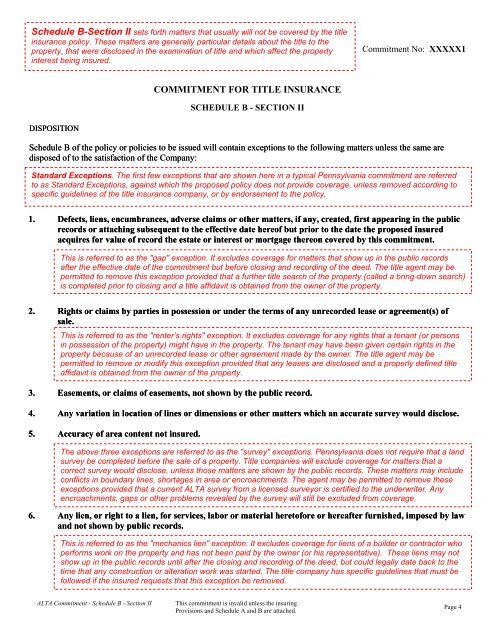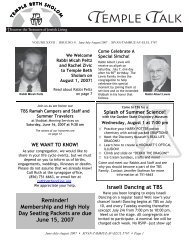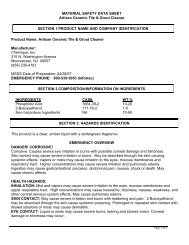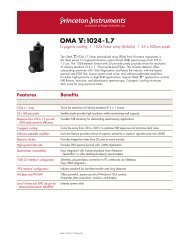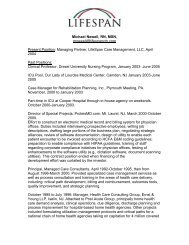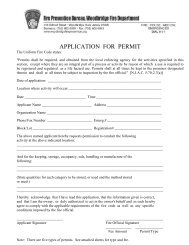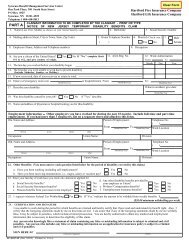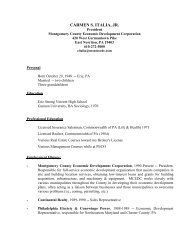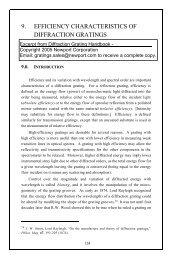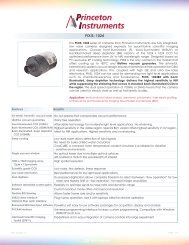Schedule B-Section II – Exceptions - Liberty Bell Agency
Schedule B-Section II – Exceptions - Liberty Bell Agency
Schedule B-Section II – Exceptions - Liberty Bell Agency
You also want an ePaper? Increase the reach of your titles
YUMPU automatically turns print PDFs into web optimized ePapers that Google loves.
<strong>Schedule</strong> B-<strong>Section</strong> <strong>II</strong> sets forth matters that usually will not be covered by the title<br />
insurance policy. These matters are generally particular details about the title to the<br />
property, that were disclosed in the examination of title and which affect the property<br />
interest being insured.<br />
DISPOSITION<br />
COMMITMENT FOR TITLE INSURANCE<br />
SCHEDULE B - SECTION <strong>II</strong><br />
ALTA Commitment - <strong>Schedule</strong> B - <strong>Section</strong> <strong>II</strong> This commitment is invalid unless the insuring<br />
Provisions and <strong>Schedule</strong> A and B are attached.<br />
Commitment No: XXXXX1<br />
<strong>Schedule</strong> B of the policy or policies to be issued will contain exceptions to the the following matters unless the same are<br />
disposed of to the satisfaction of the Company:<br />
Standard <strong>Exceptions</strong>. The first few exceptions that are shown here in a typical Pennsylvania commitment are referred<br />
to as Standard <strong>Exceptions</strong>, against which the proposed policy does not provide coverage, unless removed according to<br />
specific guidelines of the title insurance company, or by endorsement to the policy.<br />
1. Defects, liens, encumbrances, adverse claims or other matters, if any, created, first appearing in the public<br />
records or attaching subsequent to the effective date hereof but prior to the date the proposed insured<br />
acquires for value of record the estate or interest or mortgage thereon covered by this commitment.<br />
This is referred to as the "gap" exception. It excludes coverage for matters that show up in the public records<br />
after the effective date of the commitment but before closing and recording of the deed. The title agent may be<br />
permitted to remove this exception provided that a further title search of the property (called a bring-down search)<br />
is completed prior to closing and a title affidavit is obtained from the owner of the property.<br />
2. Rights or claims by parties in possession or under the terms of any unrecorded lease or agreement(s) of<br />
sale.<br />
This is referred to as the "renter’s rights" exception. It excludes coverage for any rights that a tenant (or persons<br />
in possession of the property) might have in the property. The tenant may have been given certain rights in the<br />
property because of an unrecorded lease or other agreement made by the owner. The title agent may be<br />
permitted to remove or modify this exception provided that any leases are disclosed and a properly defined title<br />
affidavit is obtained from the owner of the property.<br />
3. Easements, or claims of easements, not shown by the public record.<br />
4. Any variation in location of lines or dimensions or other matters which an accurate survey would disclose.<br />
5. Accuracy of area content not insured.<br />
The above three exceptions are referred to as the "survey" exceptions. Pennsylvania does not require that a land<br />
survey be completed before the sale of a property. Title companies will exclude coverage for matters that a<br />
correct survey would disclose, unless those matters are shown by the public records. These matters may include<br />
conflicts in boundary lines, shortages in area or encroachments. The agent may be permitted to remove these<br />
exceptions provided that a current ALTA survey from a licensed surveyor is certified to the underwriter. Any<br />
encroachments, gaps or other problems revealed by the survey will still be excluded from coverage.<br />
6. Any lien, or right to a lien, for services, labor or material heretofore or hereafter furnished, imposed by law<br />
and not shown by public records.<br />
This is referred to as the "mechanics lien" exception. It excludes coverage for liens of a builder or contractor who<br />
performs work on the property and has not been paid by the owner (or his representative). These liens may not<br />
show up in the public records until after the closing and recording of the deed, but could legally date back to the<br />
time that any construction or alteration work was started. The title company has specific guidelines that must be<br />
followed if the insured requests that this exception be removed.<br />
Page 4
COMMITMENT FOR TITLE INSURANCE<br />
SCHEDULE B - SECTION <strong>II</strong> (continued)<br />
7. Possible additional tax assessments for new construction and/or major improvements.<br />
ALTA Commitment - <strong>Schedule</strong> B - <strong>Section</strong> <strong>II</strong> This commitment is invalid unless the insuring<br />
Provisions and <strong>Schedule</strong> A and B are attached.<br />
Commitment No: 26541<br />
This exception excludes coverage for real estate taxes that are not yet due but will be assessed because of new<br />
construction or improvements made to the property prior to closing. The title agent may be permitted to remove<br />
or modify this exception provided specifically defined title affidavit is obtained from the owner of the property.<br />
8. Subject to rights of way, easements, reservations, restrictions or conditions that may be of record, as may<br />
be found in prior deeds forming the chain of title, or as shown on the recorded plan, but are not specifically<br />
disclosed herein.<br />
This is referred to as the "historical restriction" exception. Covenants, Reservations, Restrictions and other<br />
related title matters are disclosed when the title is examined and are typically excluded from coverage. These<br />
matters are specifically shown in <strong>Schedule</strong> B <strong>–</strong> <strong>Section</strong> <strong>II</strong>.<br />
Typically a commitment does not entail a comprehensive title search back to the original grant of the land, and<br />
therefore is not a complete abstract of title. This “historical restriction” exception excludes those matters that may<br />
be of record prior to the period of time reviewed in the title search. These matters, if found in a comprehensive<br />
title search, would have typically been excluded from coverage.<br />
Restrictions or covenants of record may limit the purposes for which the property can be used. They may also<br />
establish standards for improvements or require the owner to have any construction or alteration plans approved<br />
in advance by other parties. Restrictive covenants could also provide for a lien to be automatically placed on the<br />
property for assessments or other charges payable to an owners' association, the developer or other third party.<br />
Specific exceptions are disclosed hereafter.<br />
The title insurance company has a number of endorsements available that could give some additional coverage<br />
relative to the exceptions that would be shown on <strong>Schedule</strong> B-<strong>Section</strong> <strong>II</strong>. You should contact the title agent to<br />
discuss what additional coverage would be available by endorsement. <strong>Liberty</strong> <strong>Bell</strong> <strong>Agency</strong> has published a list of<br />
endorsement available on their website at www.<strong>Liberty</strong><strong>Bell</strong><strong>Agency</strong>.com/insurance/endorsements.aspx.<br />
Page 5


